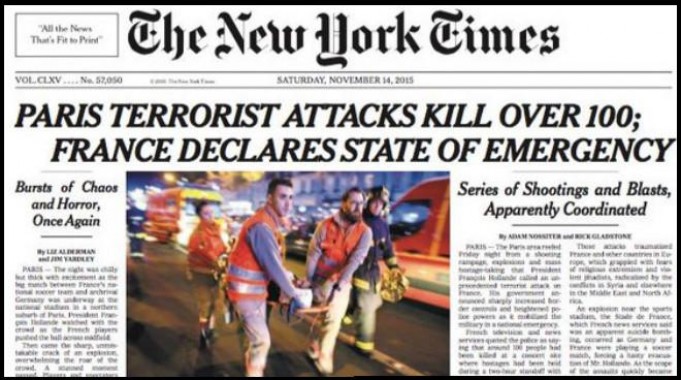It’s True, media did cover Beirut bombings
Reprinted from FAIR.org
Max Fisher takes issue in Vox (11/16/15) with people who complain about the lack of media coverage of ISIS’s bombings in Beirut compared to its attacks in Paris:
“The media has, in fact, covered the Beirut bombings extensively.
The New York Times covered it. The Washington Post, in addition to running an Associated Press story on it, sent reporter Hugh Naylor to cover the blasts and then write a lengthy piece on their aftermath. The Economist had a thoughtful piece reflecting on the attack’s significance. CNN, which rightly or wrongly has a reputation for least-common-denominator news judgment, aired one segment after another on the Beirut bombings. Even the Daily Mail, a British tabloid most known for its gossipy royals coverage, was on the story. And on and on.
Yet these are stories that, like so many stories of previous bombings and mass acts of violence outside of the West, readers have largely ignored.”
Let’s grant Fisher one point: The much-retweeted Twitter complaint that “no media has covered” the Beirut bombing is wrong—as is most media criticism that asserts that “no media” did anything.
But Fisher’s overarching argument—that because “the media does cover Beirut,” it’s wrong to blame media for the fact that “the world truly does care more about France”—is equally absurd.
Let’s take Fisher’s first for-instance, for instance. The New York Times did cover the Beirut blasts—in one story, on page 6, that FAIR criticized because it initially framed the attack as being aimed at a “Hezbollah stronghold”; if you can think of a better way to discourage Americans from caring about the victims of a terror attack, let me know.
By comparison, the Times (11/14/15) had six first-day stories on the Paris attacks, three of them on the front page. There were some 20 follow-up stories the next day (11/15/15), four of them on the front page. The day after that (11/16/15), there were 15 more follow-up stories, another four on Page 1. One of the November 16 follow-ups—on page 6—looked at reactions in Beirut to the Paris bombing. This was cited by Fisher as proof that media were too covering Beirut!
Fisher’s piece notes a fact of human nature: “People start with a narrative they feel is true, and then look for evidence to support that narrative.” To find evidence to support that claim, Fisher need look no further than the mirror.
Jim Naureckas is the editor of FAIR.org.







